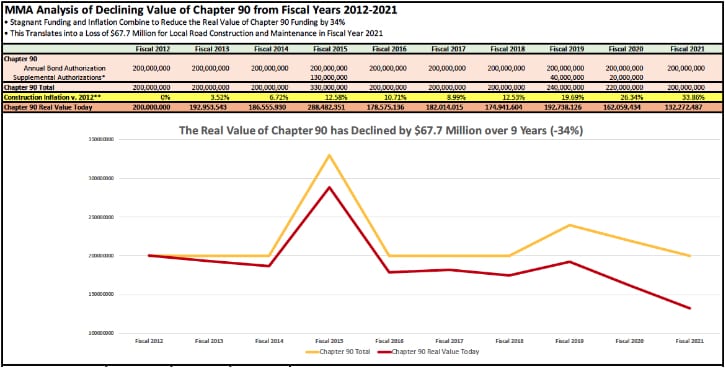Who is a member?
Our members are the local governments of Massachusetts and their elected and appointed leadership.
The Honorable Michael O. Moore, Chair
Senate Committee on Bonding, Capital Expenditures and State Assets
State House, Boston
Dear Chair Moore and Members of the Committee,
On behalf of the cities and towns of the Commonwealth, the Massachusetts Municipal Association is submitting comments regarding H. 4547, An Act authorizing and accelerating transportation investment, known as the transportation bond bill. The MMA deeply appreciates the legislation’s commitment to fund a number of important municipal programs, especially the desperately needed increase in Chapter 90 to $300 million annually, along with the billions of dollars of investment in our transportation infrastructure to benefit all who live, work, and travel in Massachusetts.
The transportation bond bill would reauthorize funding for several existing local road programs, including $70 million for the Municipal Small Bridge Program and $50 million for the Complete Streets Funding Program, as well as $100 million for a new Municipal Pavement Program. Communities across the Commonwealth have benefited from the Complete Streets and Small Bridge grant programs, using these funds to pay for projects that would be difficult to complete without state support. The MMA also appreciates the addition of the new pavement grant program, which would fund improvements to locally owned, state-numbered routes. We know from our members that it is costly to maintain the condition of these roads, and the new grant program is a step in the right direction toward more balanced cost-sharing with the state.
The MMA is very pleased that the bill before you provides a much-needed increase in the Chapter 90 program, bringing annual funding to $300 million. The MMA respectfully requests that the Senate Bonding Committee maintain this critical increase in Chapter 90 funds.
As you know, local officials in every corner of the state have repeatedly called for an increase in funding for the Chapter 90 program, because it is the only source of unrestricted, equitably-distributed local road funding available to cities and towns. Chapter 90 bond-funded allocations have been stagnant at $200 million since fiscal 2012, except for fiscal 2015 when the Administration released $100 million in previously withheld authorizations to bring that year’s Chapter 90 funding to a very welcome $300 million. There have also been three smaller one-time supplemental authorizations ($30 million in fiscal 2015 for the Winter Recovery Program; $40 million in a cash appropriation in fiscal 2019 from the fiscal 2018 state surplus; and $20 million in a cash appropriation in fiscal 2020 from the fiscal 2019 state surplus). Yet the challenging reality is that the purchasing power of the Chapter 90 program has been substantially diminished since fiscal 2012. According to our analysis, if Chapter 90 remains at $200 million for fiscal 2021, the real (inflation-adjusted) level of state support for local road projects will have dropped by 34 percent, to an inflation-adjusted $132.3 million in fiscal 2021. That is a loss of $67.7 million in purchasing power over the past nine years. Please see the chart below for details.

The Chapter 90 program is an essential component of municipal capital plans, and communities rely on these funds to keep local roads passable and safe for motorists, cyclists, pedestrians and other roadway users. Chapter 90 provides necessary resources to maintain and build the 30,000-mile local transportation infrastructure system that serves as the platform for economic development, commerce and growth in every corner of the state. Municipal road projects are also increasingly important as local initiatives respond to climate change and other environmental challenges, such as stormwater management. Chronic underfunding and the lack of a multi-year approach to Chapter 90 are holding back progress in our shared transportation and environmental policy goals.
We respectfully request that this transportation bond bill move forward as soon as possible, maintaining funding for the targeted municipal grant programs and the long-awaited increase to $300 million for the Chapter 90 program. As Massachusetts seeks to rebuild its economy from the depths of the COVID-19 recession, injecting funds into our transportation and construction industry will create jobs, improve commerce, and enhance safety. Local leaders look forward to partnering with the Legislature and the Administration, and putting these funds to work immediately to improve transportation infrastructure throughout the Commonwealth and move the state forward.
If you have any questions, please do not hesitate to have your office contact me or MMA Legislative Analyst Ariela Lovett at alovett@mma.org. Thank you very much.
Sincerely,
Geoffrey C. Beckwith
MMA Executive Director & CEO